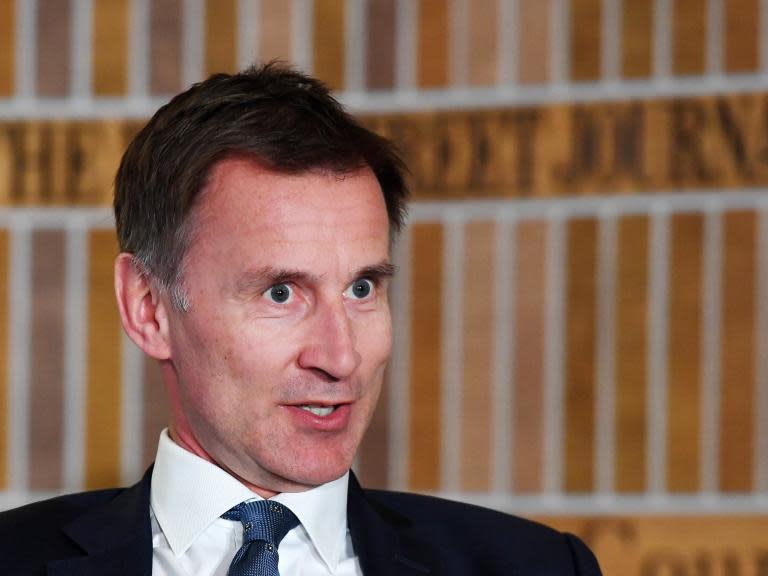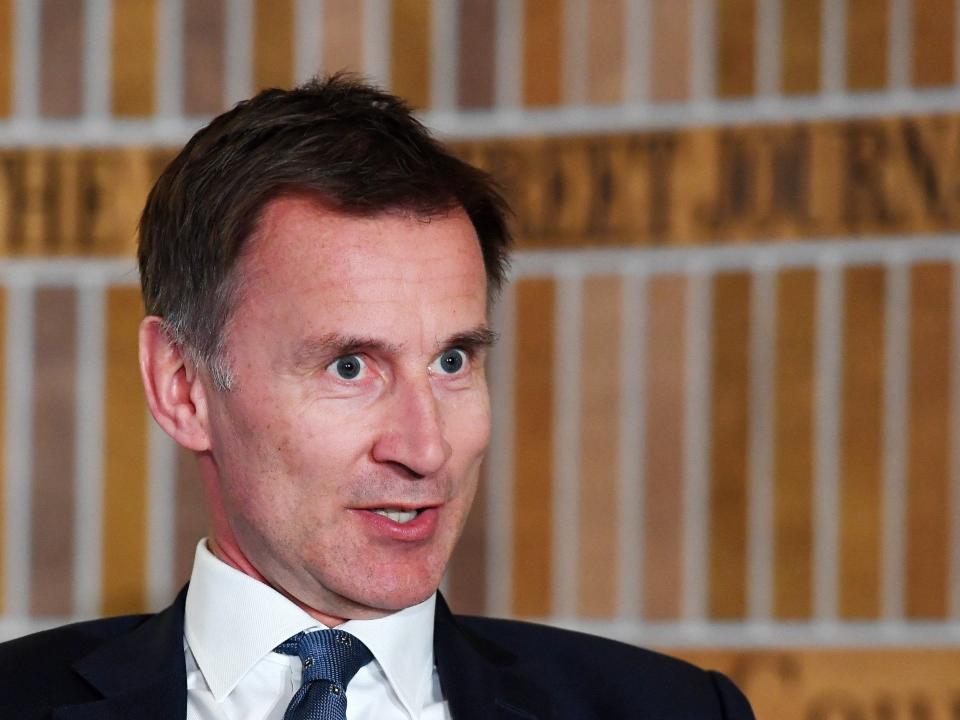Jeremy Hunt criticised for taking ‘cavalier approach’ to women’s needs after abortion time limit comments
Jeremy Hunt has been fiercely criticised after saying he believes the time limit for having an abortion should be halved, from 24 weeks to 12, in an interview about his prime ministerial ambitions.
The Conservative leadership contender, who served as health secretary between 2012 and 2018, said it was still his view abortions should only be allowed for women up to 12 weeks after conception.
The foreign secretary did not guarantee that the time limit would remain unchanged should he emerge triumphant from the crowded race to replace Theresa May as Tory leader.
Asked about the issue on Sky News’ Sophy Ridge on Sunday programme, Mr Hunt said: “These are matters of conscience, yes, my view hasn’t changed on that. I respect the fact other people have very different views and that’s why these matters are matters for free votes in the House of Commons.”
But Mr Hunt attempted to quell consternation and anger on Monday by ruling out any changes to abortion law if he becomes the next PM – telling the BBC: “No government I lead will ever seek to change the law on abortion.”
Abortion providers and abortion rights activists have hit out at the politician for his views – explaining that those who seek an abortion after 12 weeks often do so because they are in a highly vulnerable position. Only one per cent of abortions were carried out after 20 weeks of pregnancy in England and Wales in 2017.
Pro-choice UK campaign group Abortion Rights said those who seek an abortion after 12 weeks include women whose personal circumstances change dramatically after conceiving, due to bereavement, family illness or domestic violence, as well as young women hiding or in denial about their pregnancies, and women not aware they were pregnant due to having been using contraception.
Kerry Abel, chair of the national organisation, said: “Abortion care is not an issue to play politics with. Dramatically restricting abortions by slashing the time limit is a poor way to show leadership.
“The comments politicise the debate around the abortion time limit and do not put women at the centre of their care. Reducing the time limit to 12 weeks would severely limit women’s choice at an extremely difficult time in their life. At the moment, access to services is sometimes delayed, making it harder for women to get the care they need.”
If the intention is to reduce the abortion rate, then health services should invest in the provision of comprehensive contraceptive services that improve access and provide women with a range of options, she added.
Franki Appleton, of UK abortion provider Marie Stopes, said: “It is very sad and worrying that one of the candidates to be the next prime minister seems to have no regard for women’s rights, bodies, health and welfare.
“Before Mr Hunt suggests radically reducing time limits, we would suggest he meets some of the women and pregnant people who need second-trimester abortions. Whether it is Northern Irish citizens having to arrange travel to England for abortion care, victims of domestic abuse, or simply those who have not had pregnancy symptoms, we need to trust women to decide what is right for them.”
Ms Appleton said laws and policies blocking access to safe abortion across the globe mean that each year 25 million women resort to dangerous and unsafe methods to end an unintended pregnancy. She said their teams across the world witness and deal with the “terrible consequences” of this every day – adding that no one should be trying to replicate this situation in the UK and should instead be fighting to decriminalise abortion and give equal rights to access for women in Northern Ireland.
The government is facing calls to give women in Northern Ireland the right to an abortion where there is a ban on abortions in almost all cases – even rape or incest. Abortion is only permitted when there is a risk to the life of the mother or a serious risk to her physical or mental health.
Twelve abortions were carried out in Northern Ireland last year, official statistics show. Amnesty International is calling for liberalisation of the stringent rules – saying more than 900 women travelled to England and Wales for the procedure during the same period.
Clare Murphy, of the British Pregnancy Advisory Service, the UK’s largest abortion provider, noted women often need access to abortions after 12 weeks due to receiving the “devastating news” that something is wrong with a “much wanted pregnancy”. She said: “To take such a cavalier approach towards the needs of the women of the UK while effectively campaigning to be their next prime minister is both breathtaking and alarming.
“It should also be noted that during his time as health secretary, Hunt refused to implement measures that could have improved women’s access to earlier abortion by allowing women to use some of the medication needed at home, thereby reducing the number of appointments women were compelled to attend. This was enacted by his successor Matt Hancock.”
He also failed to push forward important public health measures that would have reduced the number of pregnancies affected by neural tube defects, which usually end in the termination of a greatly wanted pregnancy, Ms Murphy added. She said his support for a reduction in the time limit has never been accompanied by measures that would assist women in accessing services at the earliest gestations, or indeed help some women avoid needing to end a pregnancy altogether.
Ms Murphy said it was fortunate the politician’s views are not representative of the vast majority of his colleagues and that parliament has repeatedly indicated its support for further liberalisation of abortion laws – including extending rights to the women of Northern Ireland.
Labour MP Jess Phillips hit out at Mr Hunt’s comments on Twitter, saying: “Jeremy Hunt how about we base this stuff on evidence and science and keep what you think is best based on no experience out of this.”


